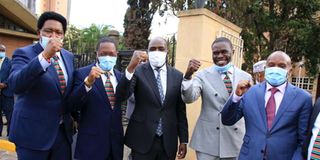Back to the table for senators on county cash formula crisis

Senators react outside Parliament Buildings after a debate on the third basis formula of sharing county revenue on August 4, 2020.
What you need to know:
- The group plans to engage political party leaders.
- It has emerged that some of the hardline positions being taken by some senators are their bosses’.
- A total of 34 lawmakers voted in favour of the motion to adjourn.
The push for a win-win outcome was behind yesterday’s last-ditch effort that saw the Senate, for a record seventh time, suspend debate on the third basis formula of sharing county revenue to explore a middle ground.
And even though the voting on the adjournment went along regional lines, especially among counties that stand to benefit should the proposed formula be adopted, there was realisation among senators that their hardline positions would divide the country down the middle.
“As ‘Team Kenya’, we had overwhelming numbers to shoot down the proposal, but we reconsidered the matter and agreed to give dialogue a chance,” said Kakamega Senator Cleophas Malala after the vote was taken.
He told the Nation that in their push for dialogue, they will consult and build consensus by bringing everybody interested in the process – including President Uhuru Kenyatta, ODM leader Raila Odinga and the Commission on Revenue Allocation (CRA).
Room for more talks
Mr Malala’s sentiments were supported by Homa Bay Senator Moses Kajwang, who said the adjournment is meant to open room for more talks, which will bring all senators, party leaders and CRA on the table.
The group plans to engage political party leaders, because it has emerged that some of the hardline positions being taken by some senators are their bosses’.
Majority Whip Irungu Kang’ata has been reminding the country that the committee’s proposal is a government position and that it has the blessings of the President.
A total of 34 lawmakers voted in favour of the motion to adjourn, brought by Elgeyo-Marakwet Senator Kipchumba Murkomen, arguing that giving dialogue a chance would help get a solution that would help unite the country through equitable share of revenue.
Postponing problem
However, 26 senators, a majority of who support the proposed third basis formula, voted to reject the adjournment, arguing that it was tantamount to postponing a problem.
Busia Senator Amos Wako abstained from the vote.
As a result of the vote, the leadership of the House was meeting late last evening to decide when the consultations will take place and how this will be carried out so as to have a solution as early as Tuesday next week.
While moving the motion, Mr Murkomen described the Senate as a citadel of hope, saying the whole country is looking up to the House for leadership to agree on a formula that will unite the country.
Mr Murkomen argued that the formula, as developed by the Commission on Revenue Allocation (CRA), the report of the Finance Committee and the amendment suggested by Nairobi Senator Johnson Sakaja had failed to bring the country together.
Baseline
In the amendment, Mr Sakaja had identified Sh316.5 billion, the allocation counties received in the 2019/20 financial year, as the baseline and which the proposed formula should not apply.
In his view, each of the 47 counties should receive the allocation they got in the 2019/20 financial year, with the new formula being applied to any figure above the Sh316.5 billion.
On Tuesday, senators James Orengo (Siaya) and Kimani Wamatangi (Kiambu) filed two different amendments to the committee’s report.
Mr Wamatangi deletes Sakaja’s proposal that Sh316.5 billion should be the baseline, which should not be subjected to the proposed formula.
Mr Orengo wants the CRA mandated to reconsider the matter.
In particular, he wants the report of the House committee on Finance and the Hansard of last week’s proceedings in which the senators expressed concern on the formula taken to the CRA, for the agency to review its original recommendations and submit the report back to the Senate in three months.




